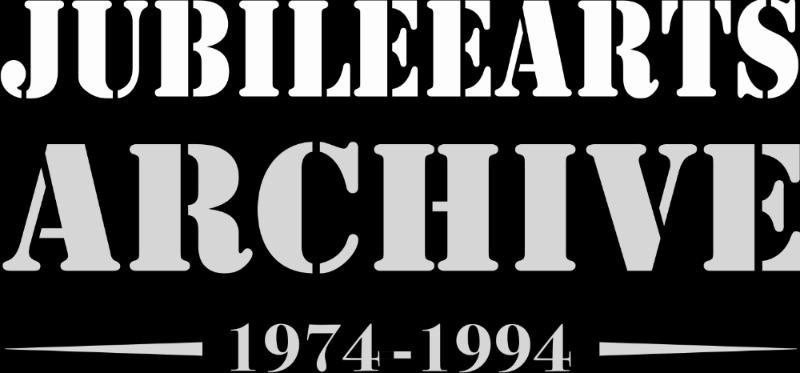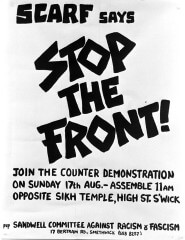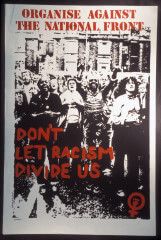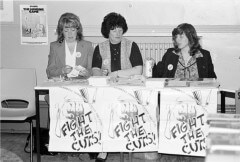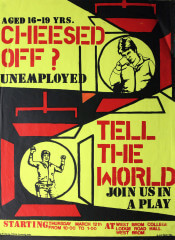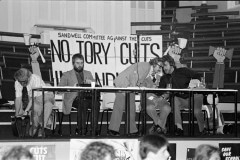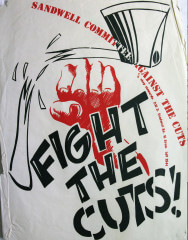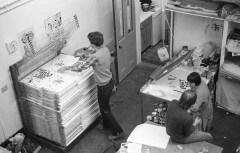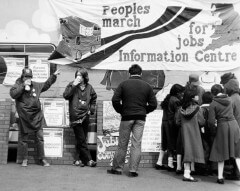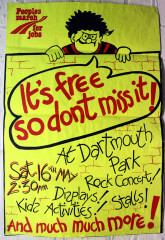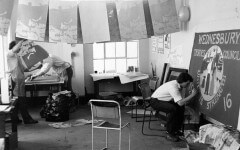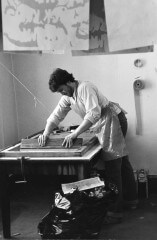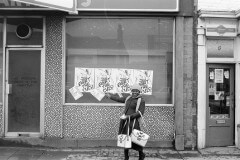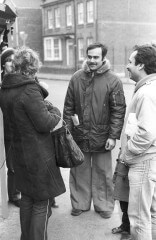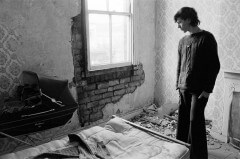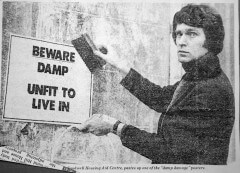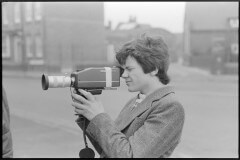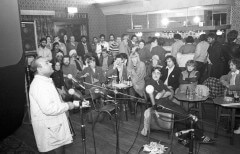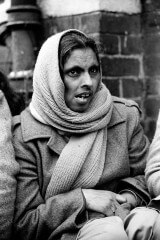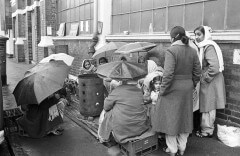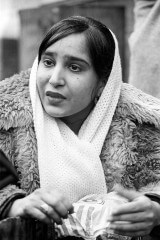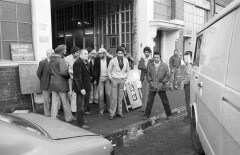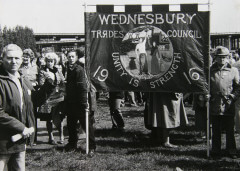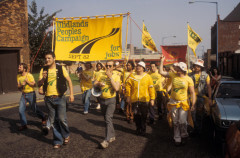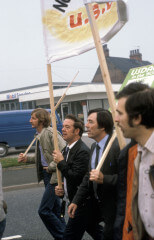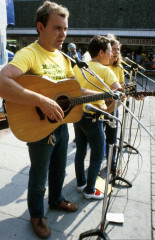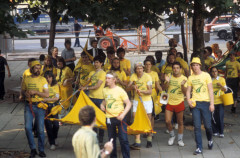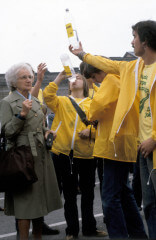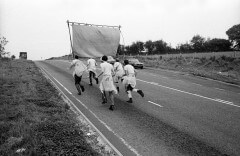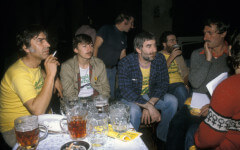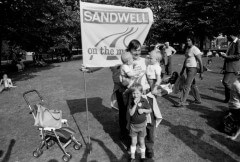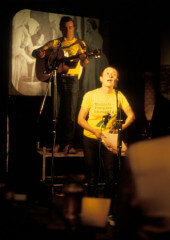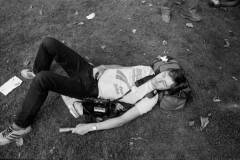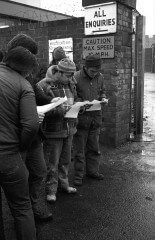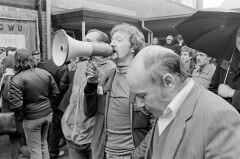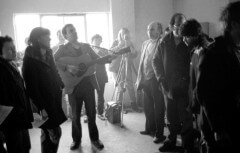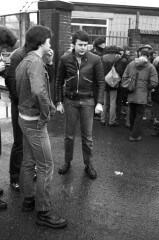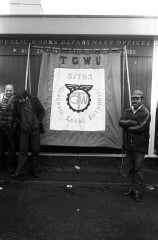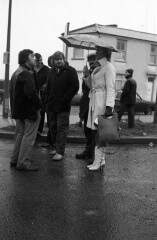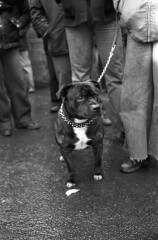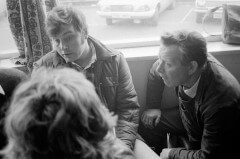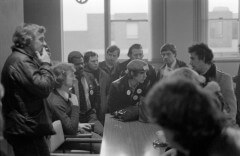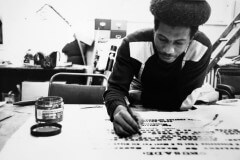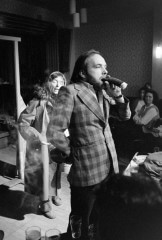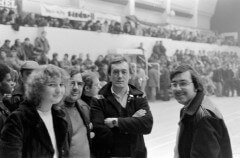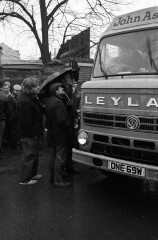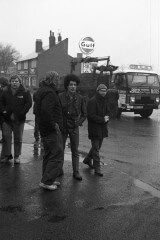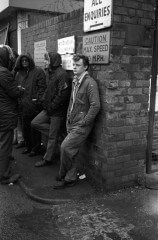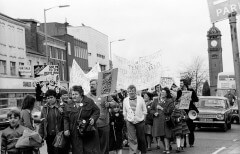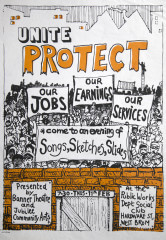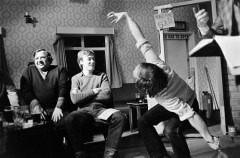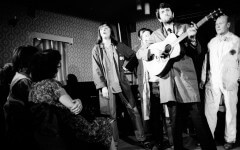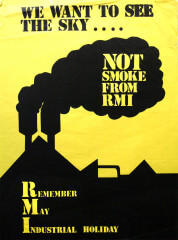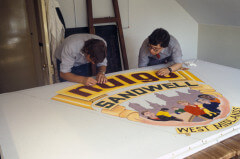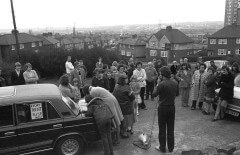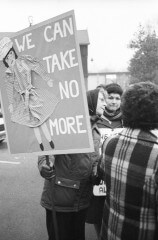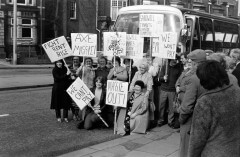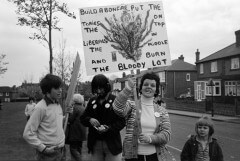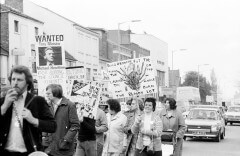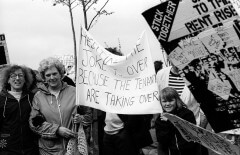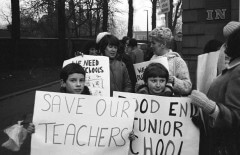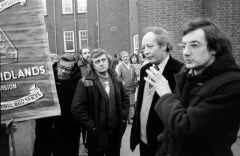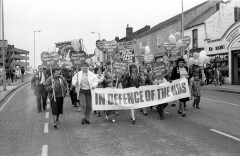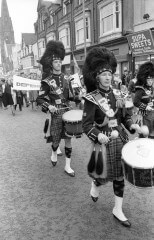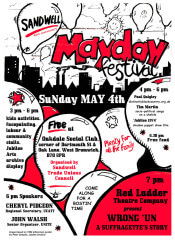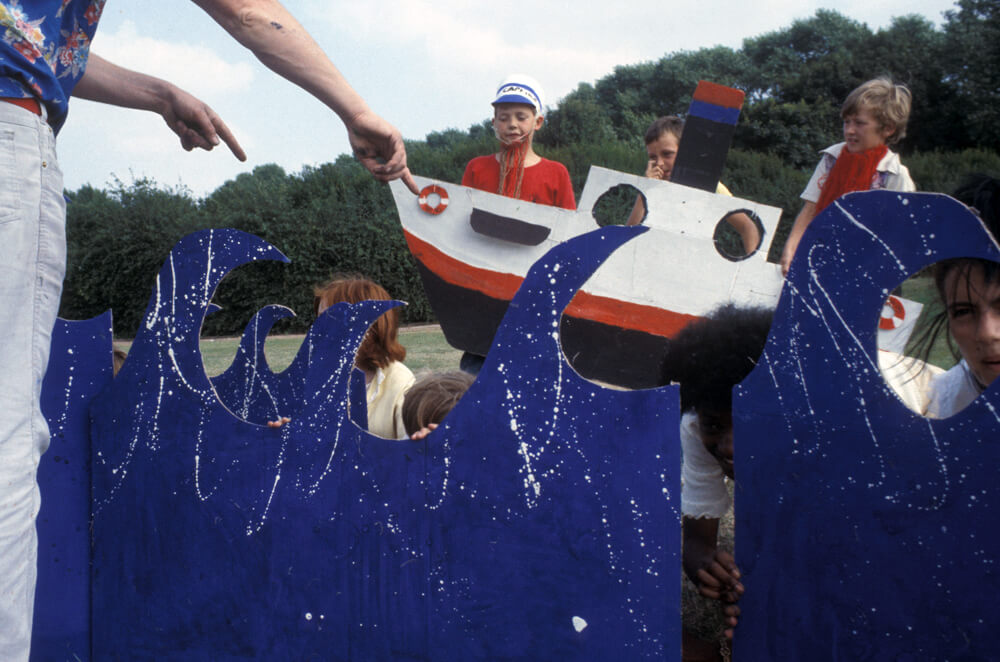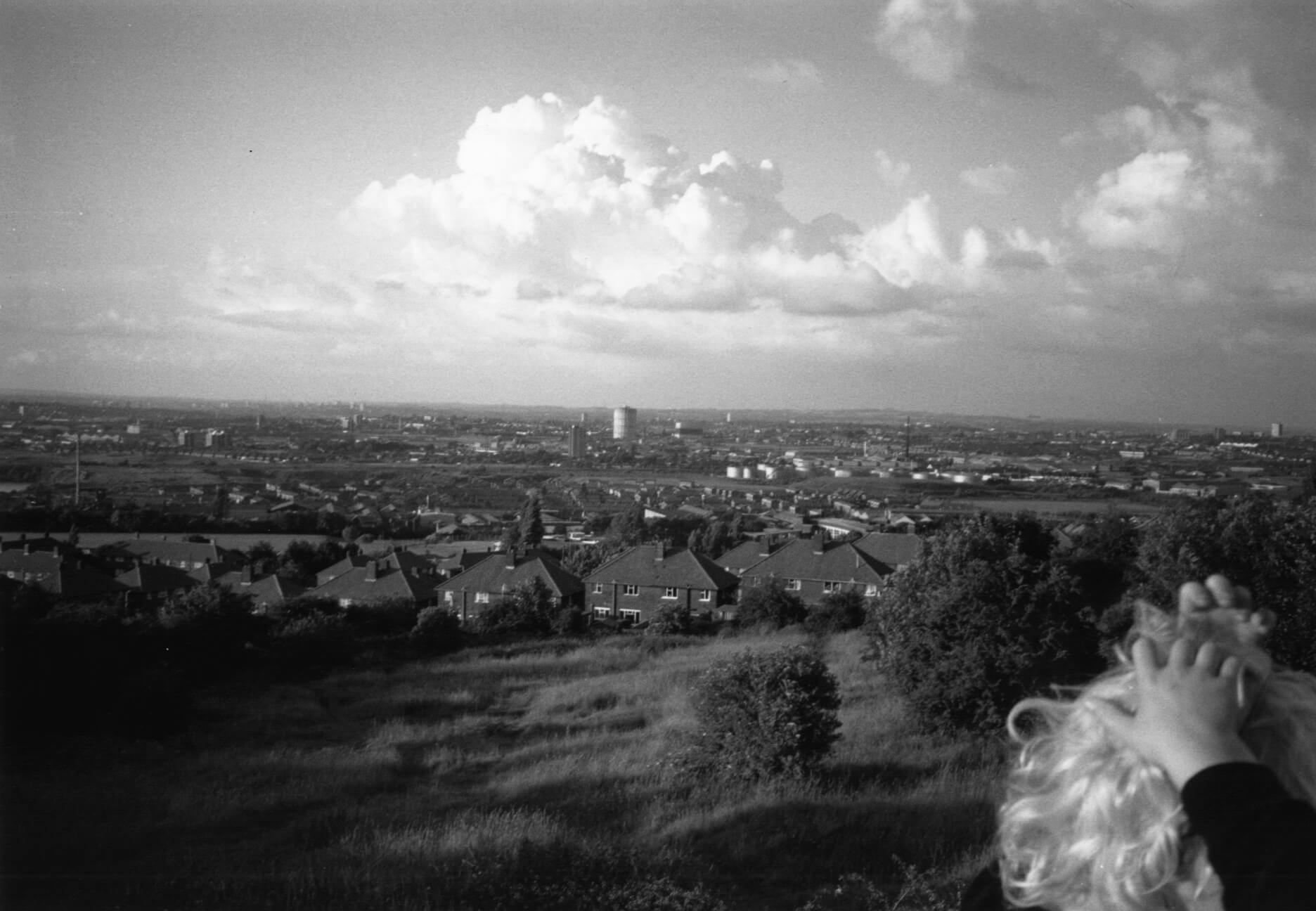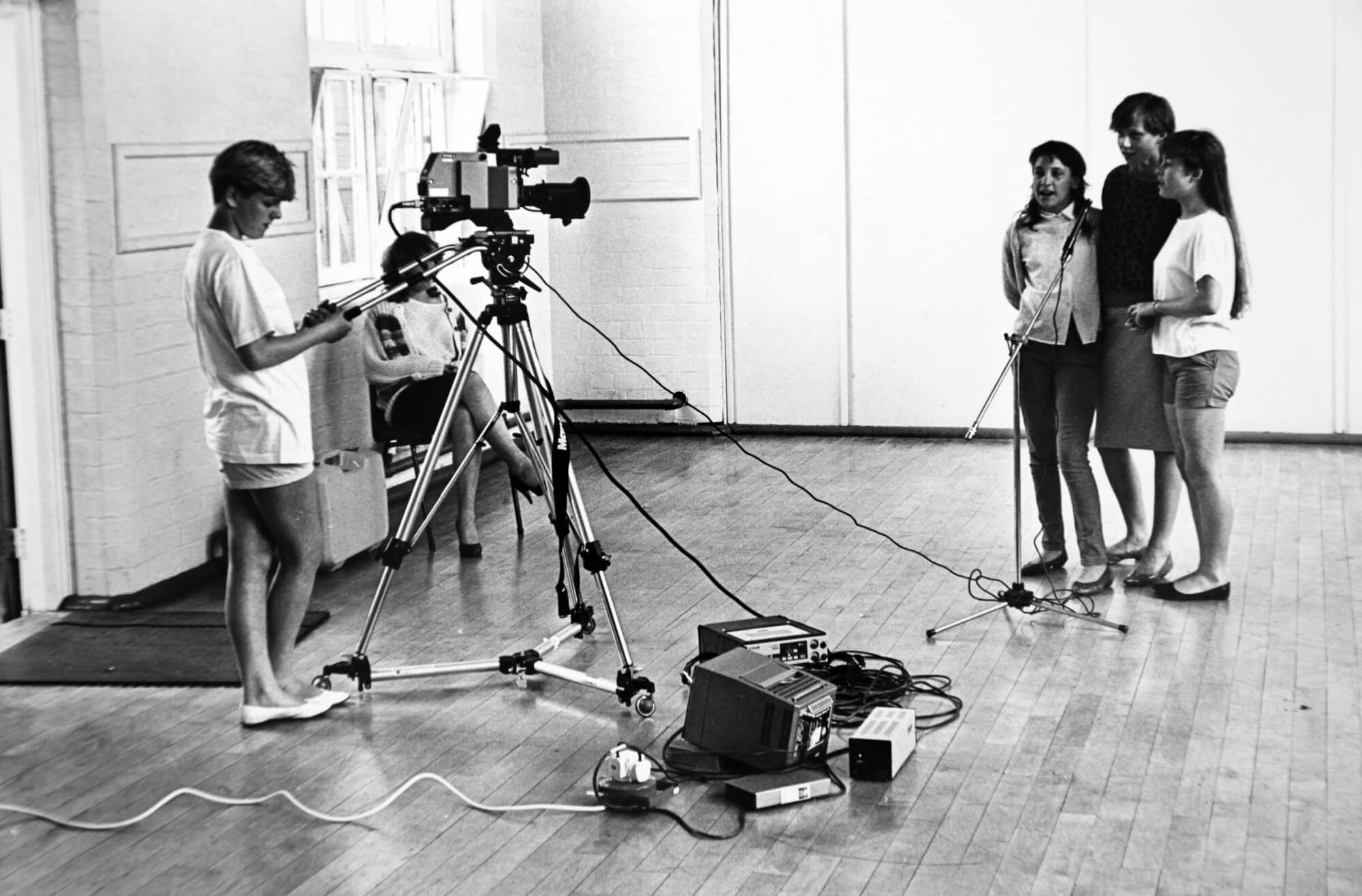Challenging the status quo is a difficult business. Jubilee Arts were naturally inclined to side with the underdog, asking themselves: ‘What can we do about inclined to side with the underdog, asking themselves: ‘What can we do about this?’ Their sympathies lay with the tenants campaigning to improve their basic living conditions or with trade unionists victimised for pursuing their union activities. They worked alongside Sandwell Committee Against Racism and Fascism, they worked on the organising of the 1982 Midlands Campaign For Jobs and with miners groups in 1984-5. They lent their 35 mm camera to community groups, made videos with dole queue youth, created and performed shows in solidarity with campaign groups (often with Banner Theatre), helped make placards and banners, printed posters and t-shirts with silkscreen, made flyers with a Gestetner machine.
As Brian Martin in Philosophy and Social Action (1994) puts it: ‘Far from destabilising democracy, protest has been instrumental in forcing the introduction of most of the freedoms that now exist in liberal democracies. Direct action, mostly nonviolent, played a major role in the ending of slavery, extension of the franchise, curtailing ruthless aspects of the exploitation of labour and extending rights to women and minorities. Many of the so-called normal channels for working through the system, which are often recommended as prior to or preferable to direct action, have themselves been established through direct action’. Or, as local parlance might have it, they were willing to ‘gie it sum ’ommer!’
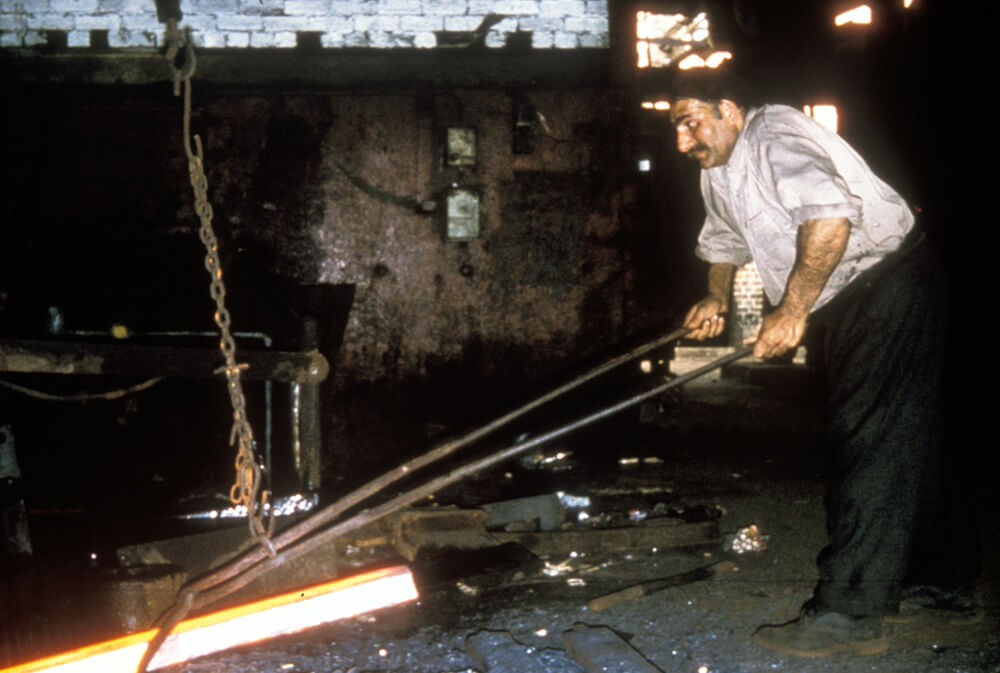
John Bagnall & Sons Limited of Wednesbury manufactured wrought iron, re-rollers of steel strip, bars and sections, and undertook acid pickling, normalising, and annealing steel strip and bars. The firm’s products in the 1870s were much the same as in 1960, except that the product range included boiler plates and rails. They also manufactured square edged flats, and steel tubes and fittings for the vehicle industry, and splayed barrel hoops for the brewery trade.
– from Wednesbury in the 1950s and 1960s, Bev Parker
Friar Park was one of a number of estates developed in the 1930s by West Bromwich Corporation to rehouse families from town centre slum clearance. This triangular estate is bound on one side by the River Tame, the M6/M5 motorway interchange (which opened in 1970) and Bescot railway sidings, and on the southside by the 1844 Tame Valley Canal. It was an area blighted by high unemployment since 1980, when the nearby Patent Shaft steelworks closed, followed soon afterwards by a number of other nearby factories including Bagnalls. By the end of the 90s one in ten of the area’s residents were unemployed – well above the national average. Here, in the early days, Jubilee undertook a great deal of work with local tenants.
Like many working-class estates in the Black Country, people worked in the locality – the factory was often literally at the end of the street. The idea that you might travel further afield, a few miles up the road was to go somewhere quite foreign. In a pattern set by the industrial revolution, generations of families would follow each other into the same workplace. By the 70s the structure of the industrial Black Country was beginning to come apart. Unemployment was becoming the norm and definitions of community proliferated – Raymond Williams called community one of ‘the Ok words of the Seventies, one that ‘seems never to be used unfavorably’. For radicals and activists the community arts movement offered a wide range of techniques for spreading their message, through festivals, printshops, video and theatre.
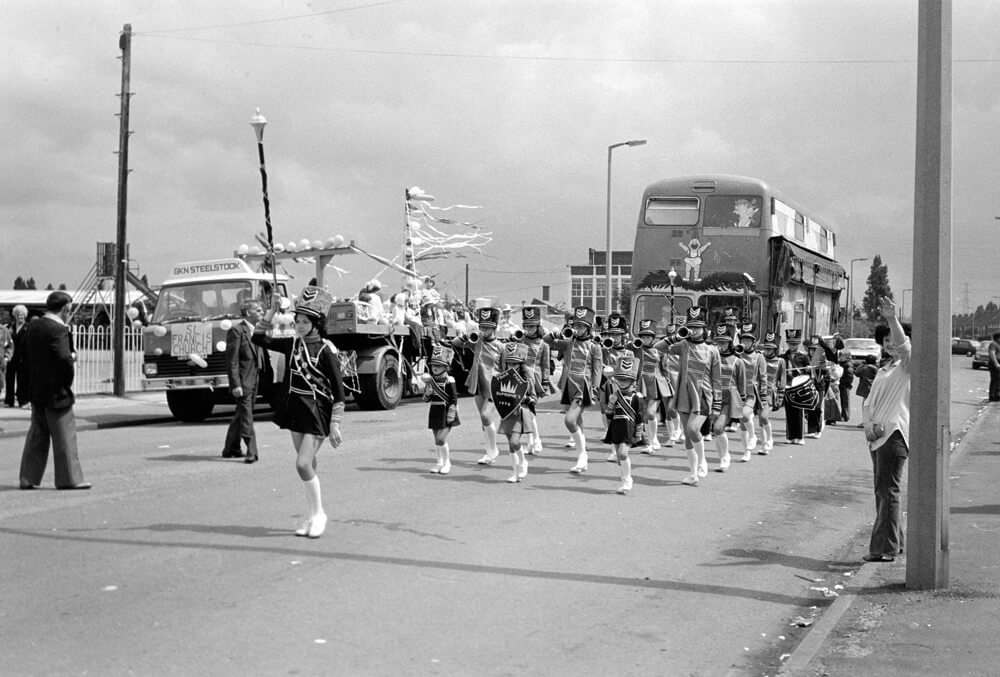
For community arts groups, as Steve Trow explains, there were some resident in a particular estate, with daily contact with local residents; on the other hand there were touring companies, with projects tailored to a locality with a clear beginning and end point. Jubilee occupied territory between the two, with both a wide catchment area – “with 300,000 people, 57,000 council tenancies and a large proportion of ethnic minority owner-occupiers, it may well be that some of the choices have already been made for you” – and a local resource base in Greets Green, along with a mobile resource, The Bus (which arrives in 1978, and is pictured above leading the procession of the Friar Park Festival). Jubilee developed contact mechanisms which were primarily responsive to the groups and issues that arose form the community.
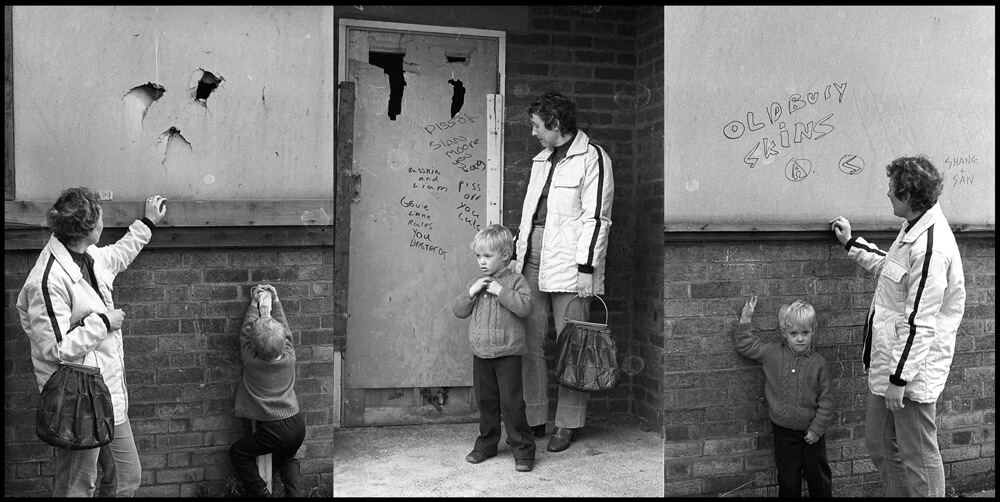
Theatre and play work on council estates such as Friar Park, Yew Tree, Langley or Whiteheath, led to contacts with the Tenants Liaison Committee, for whom decaying housing stock in general and damp in particular were major issues. This resulted in a video project, which documents their campaign and was used as an advocacy tool. Jubilee have resources – silkscreen print, photography, film – they share them. So this work may involve youth people making film about ‘Dole Q Youth’, it may involve trade unionists or school dinner ladies producing banners and posters, it may involve a group of moms in West Smethwick making a film about road safety. It could be production of banners, t-shirts, flyers, badges, for the Midlands Campaign for Jobs, with marchers from Stoke-on-Trent, Hereford, Shrewsbury, Rugby and Derby converging on the centre of Birmingham – alongside with daily documentation (slide shows and songs in the evening en route). It may be building stalls and organising a Rock Against Racism concert. It may involve the Bus getting stuck in the gates of County Hall in London, at the end of the Peoples March of 1981, and being pushed by GLC Leader Ken Livingstone (sadly no documentation exists of this moment).
All this did not sit well with funders. Secretary General Roy Shaw in his annual report to the Arts Council noted that ‘Lord Goodman…questioned whether it was the duty of the state to actually subside those who are working to overthrow it… it is a point which the Arts Council will have to consider carefully when it studies a research report on community arts later in 1979…’
Though elsewhere in the capital, there were differing views. A document produced for the GLC in October 1982, ‘Community Arts Revisited’, looked beyond traditional definitions of art and community. They stated: ‘The issue of taste, of where to draw the line between good and bad, high and low, the ugly and the beautiful, the ephemeral and the substantial, is an explicitly political one. The idea of taste is bound with the idea of the consumer: both ideas developing together and operating debilitating valuations within the field of the arts/literature. The principle of pure taste is constructed as a refusal of the popular, the vulgar, as an opposition between the cultivated bourgeoisie and the people.’ When community artists demonstrated outside the offices of the Arts Council at 105, Piccadilly, they held up Chinese placards which said ‘FEED THE DANDELIONS’ and on the other ‘CUT THE ROSES’, a reference to an early Arts Council dictum to support ‘Few, but roses’.
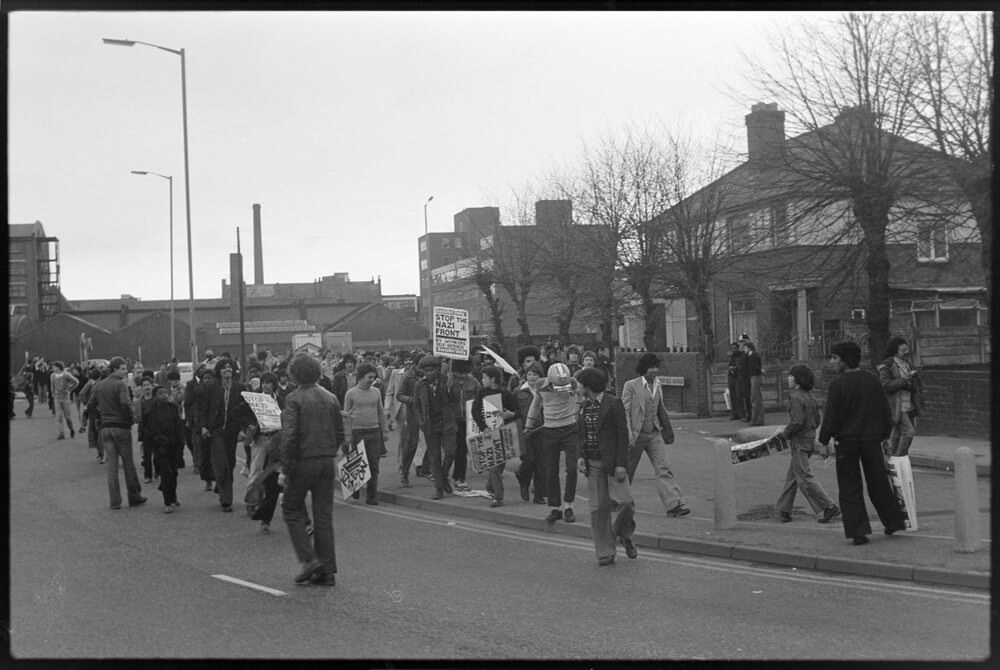
‘The National Front announce a meeting in West Bromwich, to take place the week after Southall. With our Local Committee against Racism and Fascism (another delegate organisation) we make a videotaped record of the demonstration and of the organisational work beforehand, which is then edited to be used in the defence campaign of those arrested. The project with the Liaison Committee lasted 9 months, the project with SCARF was produced in 3 weeks. The timescale is determined not by a project worker’s regular timetabled committments, or by a planned programme for the year, but by the demands and objectives of the organsiation involved. The steadily building momentum of a regular workshop would be inappropriate; the intensive experience of a one-week, or even a one month ‘residency’ would not be feasible. The project lasts as long as the particular struggle and reflects the tempo of its progress and its crises… if art is relevant, it must be relevant to the other tasks in hand.’
– from Working with Organised Groups, paper presented by Steve Trow to the Barnstable National Conference on Community Arts, 1980
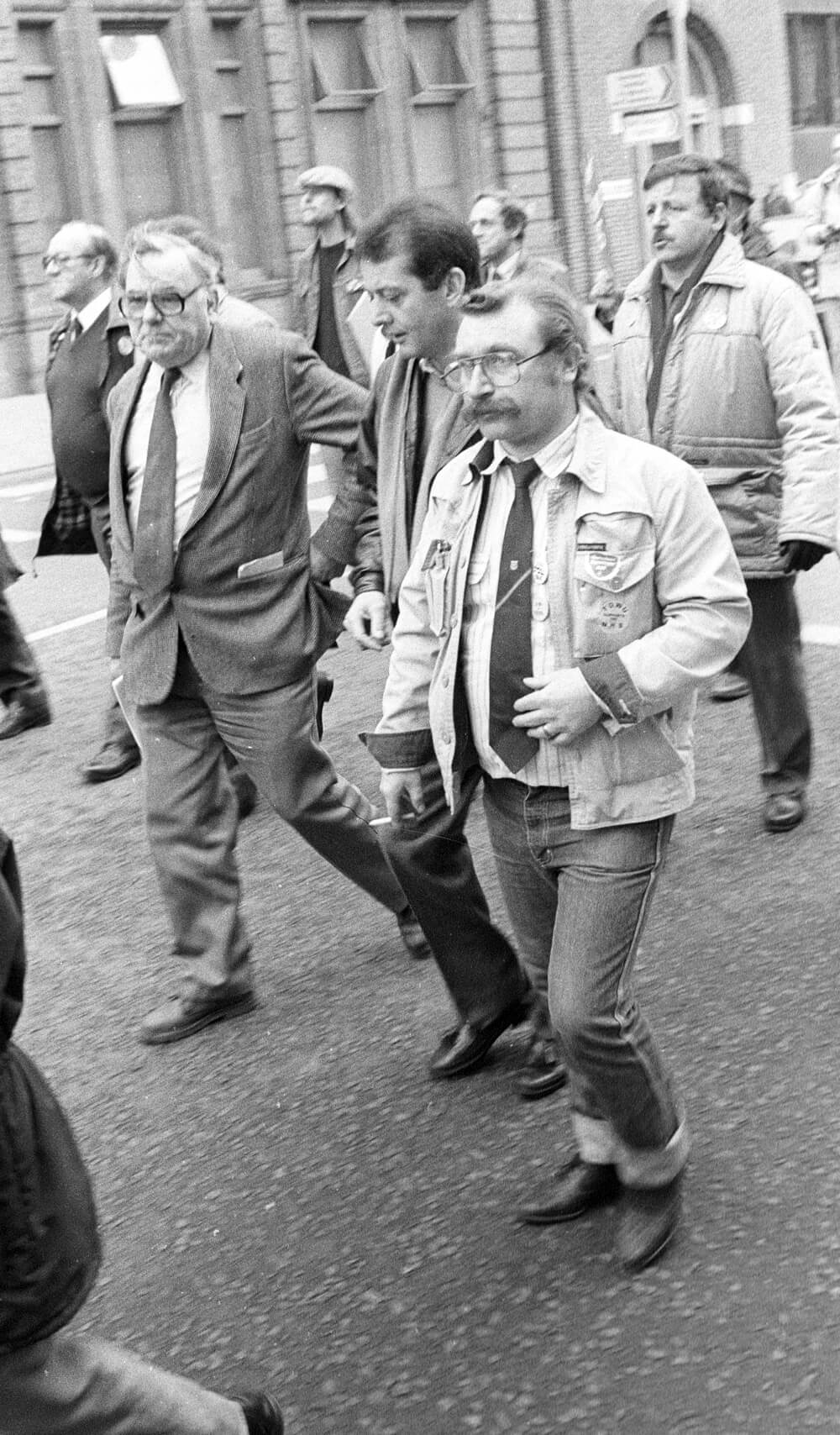
George Hickman grew up on Friar Park and still lives there. As a trade unionist, he has been involved in many campaigns over the years – Sandwell Committee Against Racism and Fascism, Fight the Cuts Campaign to name but two. George was one of those key local personalities in an area that Jubilee came into contact with; they may be a trade unionist, a youth worker, a worker with Housing Aid, or the Chair of a Tenants Committee, all leading to deeper working relationships over time.
George Hickman: “When Sandwell was formed, and let’s not forget it was actually that Tory Vera Jones who came up with the name. That’s all it was, a name, because there were these two factions of Warley and West Bromwich ripping each other apart, argueing about whether it should be called West Brom or Warley, all the rest of it. Quite frankly, it was the sort of experience you only get once in a lifetime. All these warring factions ripping each other about what the name should be Sandwell, what does it mean? I started work with the authority in ’73, when there was a dummy run, and I was shipped over to Warley to try and get them organised. The management at the time was like having a drunk in charge of a brewery. That’s when we formed the T&G 783 branch. Inside of two months we brought all of the transport section of the local authority out on strike for an increase in wages and to be recognised as professional drivers. We won that. Then we wrote a new constitution and reformed a new union body, bringing together everyone. We based it on a similar agreement that the union with Derek Robinson had with Leyland. We got called the Terrible Twins back in the day, still are apparently. I had a phone call recently from the editor of the Daily Mail who wanted to get us together and that was exactly the words he used. Now take it as a compliment to be quite frank with you, and certainly he does.”
“We created a movement in Sandwell that was never accepted by the political. A lot of the ideas we put forward from a trade union point of view are now being accepted. When we used to have disputes we had the involvement of tenants organisations, the anti-racist movement, the women’s movement, and all the rest of them and it was something to be proud of. It was the Labour politicians that were the problem attacking us, supposedly our own side. In 1979, this borough went Tory for one year, and you know in that one year we had industrial peace, we hardly had one dispute. Immediately that year was up, after the election and Labour was back in control within one month we were on strike. Outrageous. I hope we’ve got a different set of politicians, which I think we have now, but we’ll see…
“I was never out the press, as there was not a month, even a week, that went by without someone dispute. Bearing in mind I was the elected convenor of six unions in the borough; we had 2500 people working in the building and highways department with 93 stewards. Almost every sodding week we had a dispute, always created by the management, either wanting to take something off you, wanting to do something without any negotiations. Because of the movement we’d built up, Sandwell was legendary – you can go on about your Hattons and Liverpool and all the rest of it, but we’d got it. We’d got the attitude, we’d got the discipline among the members and that was what was so brilliant about it. I was proud of that and they targeted me because they saw me as a threat.”
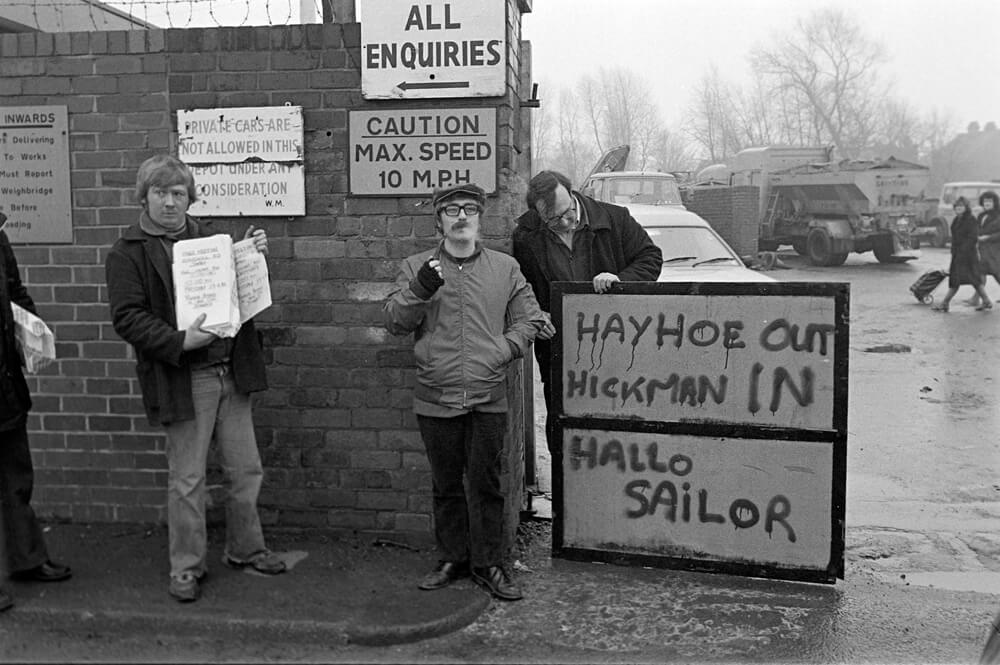
In 1981, George Hickman was suspended and then sacked from his job by the management of the Direct Works Department in an attempt to curtail his union activism, it sparked a major strike in the borough. George went on to manage the Unemployment Centre next to the library on West Bromwich High Street, which ran a print shop (a successor, in many ways, to the one Jubilee had) and continued to be involved in campaign work, such as the Midlands Campaign for Job 1982-83. Through West Bromwich Trades Council, George was also involved with promoting theatre shows, such as Banner Theatre’s ‘The Housing Game’.
Whilst Banner, based in Birmingham, generally regarded itself as deriving from the Russian revolutionary tradition of agitprop theatre, it specialised in incorporating both live music and ‘actuality’ (using recordings of oral histories) in its performances. A founder member of the company was former BBC radio producer Charles Parker, who with Ewan MacColl and Peggy Seeger, created the radio ballad. Jubilee often collaborated with Banner on campaigns.
On the fortieth anniversary of Sandwell as a borough, the Trades Council organised a May Day 2015 event very much in the spirit of previous times – even using a poster printed by Jubilee from 1982 as the base image for their publicity.
Film material from the closure of the Patent Shaft Works, Wednesbury, 1980. According to our local expert cinephile, John Bates, it’s not even Super 8, but on standard 8mm with a sound strip – a bit rare. It’s also a bit creaky, taking time to get going while we handwind the projector, but bear with us…
Sony reel-to-reel black black & white footage of Sandwell Tenants anti-damp campaign, 1980.
Sony reel-to-reel black & white footage of Anti-NF demonstration in April, 1979.
You will find some other footage on the MACE site here:
https://www.macearchive.org/films/atv-today-30041979-national-front-meeting-west-bromwich
